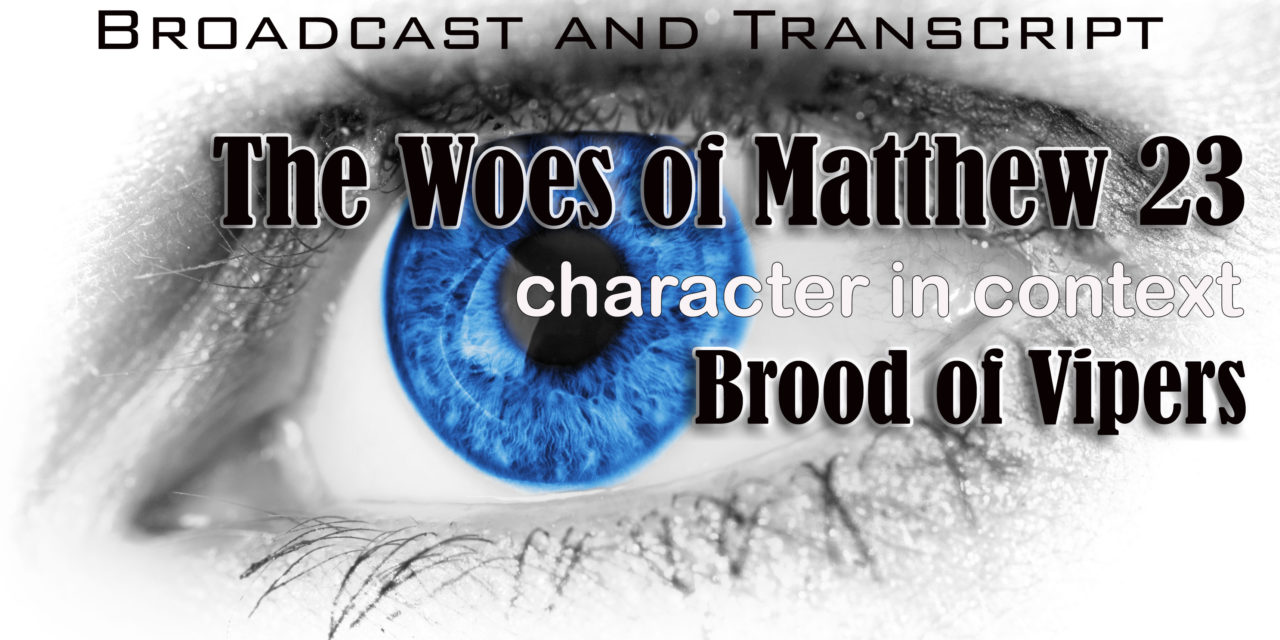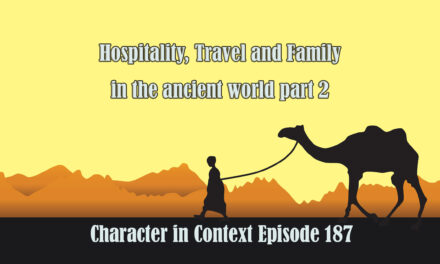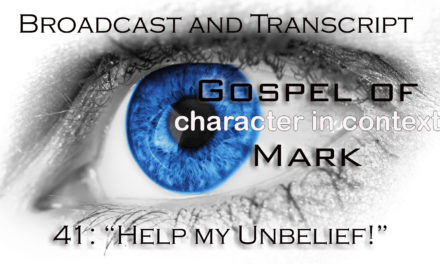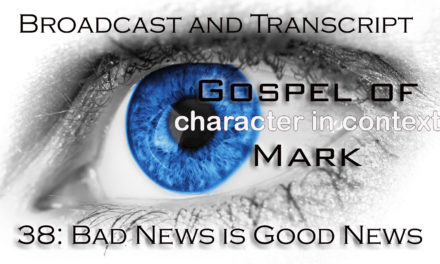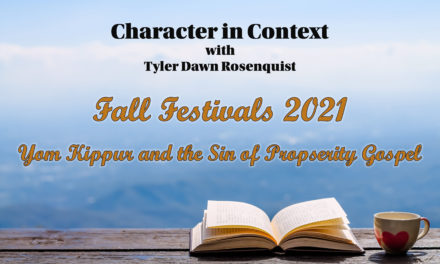Have you ever heard the legend that John the Baptist’s father was slaughtered in the Temple? Did you ever wonder where people get that from and whether or not it is even plausible? Tonight we are going to delve into the huge problems with that and reveal the surprising source that claim came from.
This is a lot of tidbits of context all squeezed into one episode, but the seventh woe is also the most serious and intricate. What was the tomb of the prophets and who built it? What are the monuments of the righteous? Why was being compared to a brood of vipers so much worse than just being compared to vipers? And why am I spending time debunking the Protoevangelium of James as a source? It’s all related and all working up to the grand finale next week.
Here’s the largely unedited transcript–you’ll survive reading any small mistakes, trust me 😉
*************************
29 “Woe to you, Torah scholars and Pharisees, hypocrites! You build tombs for the prophets and decorate the monuments of the tzaddikim. 30 And you say, ‘If we’d been alive in the days of our forefathers, we wouldn’t have been partners with them in shedding the blood of the prophets.’ 31 So you testify against yourselves, that you are sons of those who murdered the prophets. 32 Fill up, then, the measure of your fathers! 33 O snakes, you brood of vipers! How will you escape the condemnation of Gehenna?
34 “Because of this, behold, I’m sending you prophets and wise men and Torah scholars. Some of them you will kill and execute at the stake, and some of them you will scourge in your synagogues and persecute from city to city. 35 And so, upon you shall come all the righteous blood shed on earth, from the blood of righteous Abel to the blood of Zechariah son of Berechiah, whom you murdered between the Temple and the altar. 36 Amen, I tell you, all these things will come upon this generation.” (TLV)
Hi, I’m Tyler Dawn Rosenquist and welcome to Character in Context, where we explore the historical context of Scripture and talk about how it bears on our own behavior and witness as image-bearers. You can find my teachings on my websites theancientbridge.com and contextforkids.com as well as on my youtube channels, accessible from my websites. You can also access past broadcasts on my podcast channel characterincontext.podbean.com and my context books for adults and families are available through amazon.com. And my podcasts are also available on iTunes now.
Boy howdy, this week is going to be chock full of historical tidbits because this week is chock full of damning polemic spoken against the Messiah’s opponents.
This is part eight of our series on the woes of Matthew chapter 23, and the seventh woe. The section I just read for you was from the Tree of Life version, which is a messianic Jewish version of the Scripture, and I used it first because I wanted to mention the tzaddikim and their monuments.
Before we start with that, remember that this section of Scripture is different from most of the rest because it represents polemic speech, a popular form of denouncement in Greco-Roman times. Different philosophical schools would undermine one another while vying for supremacy over the hearts and minds of the people. Remember that philosophy was a way to embrace good and shun evil in the ancient world and differing philosophies had different strategies for what that looked like. As a result, they would compete for students in order to teach them to follow their ideas for reform. In the first century, the Pharisees, Sadducees, Essenes, and Zealots were identified by Josephus as the four main philosophies within Judaism—each one had a separate vision for what a faithful life to God looked like. Each one used polemic against the others (and the Essenes were the most prolific about it) in order to become THE group which would define Judaism—but none had enough power to reign supreme over all the people. Polemic speeches and writings would denounce other schools of thought as hypocrites and lodge a series of complaints against them as to why they were dangerous and leading people astray—this is how the gathered crowds in Jerusalem would have understood what Yeshua/Jesus was doing.
Up to now, He has leveled charges that they are power-hungry (Josephus agreed), egotistical, leading people astray by leading them away from the Kingdom, teaching people how to make false oaths and so bringing shame on God and His Temple, tithing in an exemplary way but while not caring one whit about the vulnerable, that they are more concerned with their private definitions of ritual purity while neglecting the circumcision of their own hearts, and that they are utterly defiled within and also a defiling influence. Ouch, what could be worse? Well, I am going to show you.
Let’s look at this week’s Scripture in the ESV:
29 “Woe to you, scribes and Pharisees, hypocrites! For you build the tombs of the prophets and decorate the monuments of the righteous,30 saying, ‘If we had lived in the days of our fathers, we would not have taken part with them in shedding the blood of the prophets.’ 31 Thus you witness against yourselves that you are sons of those who murdered the prophets. 32 Fill up, then, the measure of your fathers. 33 You serpents, you brood of vipers, how are you to escape being sentenced to hell?34 Therefore I send you prophets and wise men and scribes, some of whom you will kill and crucify, and some you will flog in your synagogues and persecute from town to town, 35 so that on you may come all the righteous blood shed on earth, from the blood of righteous Abel to the blood of Zechariah the son of Barachiah, whom you murdered between the sanctuary and the altar. 36 Truly, I say to you, all these things will come upon this generation.
So, we have (1) tombs being built for the prophets, (2) monuments for the righteous, (3) the claim that they aren’t like their forefathers, (4) a challenge from Yeshua to go ahead and finish their father’s work, (5) accusation about being a brood of vipers, (6) a prediction about exactly how they will finish their father’s works, (7) the result of their works, (8) a problem with some manuscripts, (9) and another prediction—but one that we will not cover until next week, because it actually belongs with the next few statements that we will not have time to go into.
So let’s start out with some archaeology and I hope you will look this up online later. On the western slope of the Mount of Olives, facing the Temple Mount, in the first century BCE, a magnificent tomb was built for Haggai, Zechariah, and Malachi, the post-exilic prophets—meaning the prophets who lived after the exile. They lived during the 5th and 6th centuries BCE, during the Medo-Persian occupation of the Holy Land, and were considered to be the last official prophets. So, although later medieval Jewish and Christian tradition designated these as legitimate tombs built for those prophets, the earliest dates to the first century BCE and Yeshua Himself lays the building of those tombs on modern people of his time. So, Yeshua and archaeology are in complete agreement here.
The TLV says monuments of the tzaddikim and the ESV calls them the monuments of the righteous. Same thing. Righteous ones in English is a direct translation of the Hebrew term Tzaddikim. Herod the Great was actually responsible for building magnificent monuments at Hebron and in Jerusalem. At Hebron, he was responsible for making a magnificent monument at the graves of the patriarchs (War 4.532), which was historically recorded to be well-marked and still exists to this day. He also made a monument at the entrance to David’s tomb (Ant 16.182). Herod did these things, as well as other things, like rebuilding the Temple in splendor, in order to ingratiate himself with the Jews, who considered him to be an outsider even though his grandfather was a (forced) convert to Judaism in the time of John Hyrcanus. They resented an Edomite being placed over them, being a descendant of Esau instead of a genetic Jew. Because Herod did these things to make the Jewish power players accept him, he might have built these specific monuments to make the Pharisees and Torah scholars happy. Thus Yeshua would lay the building of tombs and monuments at their feet since it was done to please them. So, that’s a quick look at the first two points. Nothing hard to understand or controversial here, right?
But then we get to the third point, that the Pharisees like to claim that they would never have participated in the killing of the prophets. This one always makes me laugh, but I wince at the same time because I know very well what it is to say, “I would never” and then go ahead and do the same thing. Generally, when we say, “I would never” it is because we have never been given the opportunity, or we just haven’t experienced that temptation, but it is always because we think we are somehow superior to the people who made different choices. That’s something we never want to do because we have no clue what we would or would not have done if raised in a different culture in a different time or if our lives were at stake, or our children’s lives, or if we were angry enough, etc. But this is exactly what the Pharisees being addressed were doing. I can’t tell you how many times I have seen people shout loud and proud that they would never deny our Messiah, only to go ahead and deny Him and not only that but preach actively against Him. There ain’t so such thing as “I would never” except in our own deluded and egotistical imaginations. The Lord’s Prayer says, “Lead us not into temptation”—did Yeshua say this because we “would never” do bad things or because He knows we would if we had half a chance? I say, from personal experience, the latter.
“We wouldn’t have killed the prophets! We would have listened and the exile to Babylon would have never happened and Solomon’s Temple would still be standing…etc…”
How exactly like us they sound, eh? Arrogantly assuming much, with no proof at all.
But as a response, Yeshua delivers a damning challenge, “Fill up, then, the measure of your fathers.” In other words, “Finish what your fathers began.” Let that sink in. Finish what your fathers started. All they did was reject the prophets—you have already rejected John and now you are rejecting, right here and right now, the Messiah. There is nothing worse. And yes, many would come to believe later and many were believers even now who did not want to publicly profess faith in Him, but at this moment in time, they were rejecting the Messiah, as a group, just as they had rejected John and not only that, they were actively working to make sure the rest of the Jews rejected Him as well.
And there is an excellent chance that if we were in their shoes, we would have too. We can never afford to forget that or we will be just like the people who hear the parable of the Pharisee and the tax collector who, after hearing the Pharisee say that he is not like the tax collector, turn around and say, “Thank God I am not like that Pharisee” and thus miss the whole point.
Yeshua now goes farther than He has before because this charge is the most severe. “You serpents, you brood of vipers, how are you to escape being sentenced to hell?”
This is very similar to the words of John the Baptist, “7 But when he saw many of the Pharisees and Sadducees coming to his baptism, he said to them, “You brood of vipers! Who warned you to flee from the wrath to come?” in Matt 3:7. In Matt 12: 34, Yeshua says “You brood of vipers! How can you speak good, when you are evil? For out of the abundance of the heart the mouth speaks.”
During those days, there was a specific belief about how serpents reproduced. I mean, serpents in that area of the word meant vipers, not rat snakes, not garter snakes, but poisonous serpents. Here in America, we have rattlers and copperheads and cottonmouths, and in the Near East they have asps and cobras and such. Vipers are venomous with large fangs. Some are aggressive and others are shy, but they are al deadly. This is why I don’t like the “serpent” translation because not all serpents, or snakes, are aggressive and deadly. Many are harmless. The TLV that I quoted from at the beginning rightly uses vipers instead of serpents or snakes.
Herodotus [5th century BCE] (History, book 3): It is found that when the male and female come together, at the very moment of impregnation, the female seizes the male by the neck, and having once fastened, cannot be brought to leave go till she has bit the neck entirely through. And so the male perishes; but after a while he is revenged upon the female by means of the young, which, while still unborn, gnaw a passage through the womb, and then through the belly of their mother, and so make their entrance into the world.
Pliny the Elder [1st century CE] (Natural History, Book 10, 82): In mating, the male viper puts his head in the female’s mouth, and she in her ecstasy bites it off. The female bears the eggs inside her until they hatch; she then gives birth to one of them a day. Since she may bear up to twenty young, the ones not yet born become impatient and burst out of her sides, killing her.
And those are the least strange ones—the ones from the middle ages are wild and some are not at all appropriate for a general audience, boy howdy. But these are the beliefs at the time of Yeshua. They did know that vipers give birth to live young, that is true, they mostly don’t lay eggs. But they didn’t exactly have zoos where they could watch the life cycle. So the bit about killing their moms was ridiculous, but it was the common belief. So, Yeshua’s insult here was worse than it would appear, not only are they labeled as vipers, poisonous and sly and dangerous, but also as creatures so murderous that they would do violence to their own mother. Now I am going to get Hebraic on you and it might be a real mind-bender but don’t get angry, please, just toss this if you get angry. When my dear friend, a serious scholar into ancient Jewish thought, taught this to me years ago, I told her I was angry but mostly I was angry because I couldn’t argue against it based on the Scriptures as a whole. It took me about a year before I was comfortable with it and I rarely teach it myself. In Hebrew writings, both biblical and nonbiblical, wisdom was always portrayed as a woman, and indeed in extra-Biblical Hebrew writings up until about the fourth century, the Ruach, the Spirit, was also portrayed as feminine. It was only in medieval times and later that the male pronoun was used. Now we are so averse to any part of the godhead having a feminine attribute that people get super angry, but wisdom is always portrayed as feminine. Christianity changed that understanding. The fruit of the spirit were all feminine attributes most of which were not highly prized in ancient males—peacefulness, patience, kindness, generosity, faithfulness, gentleness, humility and meekness—those were womanish qualities and considered shameful in the ancient world when men possessed them. So, and you can feel free to disagree with me here, this isn’t something I push on people—Yeshua might have been accusing them, in terms they would understand, of doing violence to wisdom, to the Spirit that operated in the prophets and most notably in Himself. Killing their mother, killing the spirit of wisdom. Just a thought. Now we can move on.
Let’s read this again just so we keep focus because this is a lot of information:
29 “Woe to you, scribes and Pharisees, hypocrites! For you build the tombs of the prophets and decorate the monuments of the righteous,30 saying, ‘If we had lived in the days of our fathers, we would not have taken part with them in shedding the blood of the prophets.’ 31 Thus you witness against yourselves that you are sons of those who murdered the prophets. 32 Fill up, then, the measure of your fathers. 33 You serpents, you brood of vipers, how are you to escape being sentenced to hell?34 Therefore I send you prophets and wise men and scribes, some of whom you will kill and crucify, and some you will flog in your synagogues and persecute from town to town, 35 so that on you may come all the righteous blood shed on earth, from the blood of righteous Abel to the blood of Zechariah the son of Barachiah, whom you murdered between the sanctuary and the altar. 36 Truly, I say to you, all these things will come upon this generation.
“Fill up the measure of your fathers!” This hearkens back, of course, to the times before the exile.
Isaiah said, “Therefore Sheol has enlarged its appetite and opened its mouth beyond measure, and the nobility of Jerusalem and her multitude will go down, her revelers and he who exults in her.” (5:14)
27:8 “Measure by measure, by exile you contended with them; he removed them with his fierce breath in the day of the east wind.”
47:9 “These two things shall come to you in a moment, in one day; the loss of children and widowhood shall come upon you in full measure, in spite of your many sorceries and the great power of your enchantments.”
Jer 13 24 I will scatter you like chaff
driven by the wind from the desert.
25 This is your lot,
the portion I have measured out to you, declares the Lord,
because you have forgotten me
and trusted in lies.
26 I myself will lift up your skirts over your face,
and your shame will be seen.
This is wrath language, exile language. This is the language of God warning His people, specifically the religious leaders—both appointed and self-appointed. Does this apply to every single Jew, as churches in the past have taught? No, wrath is never all-inclusive, there are always the faithful. Many Jews absolutely accepted Yeshua as Messiah and it is estimated that as many as one in five came to faith in Him during the first century—that is an enormous number. Let’s look at
Is 65 6 Behold, it is written before me: “I will not keep silent, but I will repay; I will indeed repay into their lap 7 both your iniquities and your fathers’ iniquities together, says the Lord;
because they made offerings on the mountains and insulted me on the hills,
I will measure into their lap payment for their former deeds.”
8 Thus says the Lord: “As the new wine is found in the cluster, and they say, ‘Do not destroy it, for there is a blessing in it,’ so I will do for my servants’ sake, and not destroy them all.
But right now, at this moment in time, there is a showdown between powers—Yeshua vs the religious elite who have, by and large, rejected Him and have influenced others to do the same.
Yeshua makes a prediction: “Therefore I send you prophets and wise men and scribes, some of whom you will kill and crucify, and some you will flog in your synagogues and persecute from town to town, 35 so that on you may come all the righteous blood shed on earth,”
First, “I send you.” This is divine language. This is the sending out of prophets—something that no mere man could ever claim to do, and not even a king. This is Yeshua speaking as a divine entity who has the authority to send out prophets, wise men and teachers of the Law. This is a divine pronouncement that when they persecute these people, they will be working against God, in rebellion, and will thereby become just like their forefathers, responsible for innocent blood and in next week’s teaching we will see the shocking pronouncement as to what the penalty would be. It’s easy to miss when we aren’t familiar with judgment, exile, and Temple language.
“On YOU may come all the righteous blood shed on earth.” It was a damning proclamation, no casual insult, this is judgment of God language.
Yeshua then goes on to show the magnitude of the guilt they will carry. All righteous blood from Abel, who was of course killed by his brother Cain, to the prophet Zechariah, who was killed in the Temple itself, “whom you murdered between the sanctuary and the altar.” Yeshua is grouping them together with the actual murders, not because they will actually play a part in the Passion—because they are never mentioned once, but because through their undermining of Yeshua they (more than anyone else) created the atmosphere where it was possible to have him killed by the Romans. And those who do not accept Him after the resurrection will continue to persecute God’s messengers—people like Paul, who persecuted the early Jewish believers who, remember, might have represented one in five Jews. The early church was entirely Jewish, the early evangelistic movements were also entirely Jewish. This was an intra-Jewish struggle, not Gentile vs Jew. This was competing philosophies as to the proper way to be a Jew.
“…from the blood of righteous Abel to the blood of Zechariah the son of Barachiah, whom you murdered between the sanctuary and the altar.”
Okay now, we get to a historical bit. Zechariah the son of Berechiah. Jewish writings, across the board, are notorious for confusing the thirty different Biblical and extra-biblical Zechariahs for one another. Zechariah the son of Berechiah was the Zechariah who had his own Bible book, as we see in Zech 1:1. He wasn’t killed in the Temple. The Zechariah killed in the Temple is found in II Chron 24:20-22
20 Then the Spirit of God clothed Zechariah the son of Jehoiada the priest, and he stood above the people, and said to them, “Thus says God, ‘Why do you break the commandments of the Lord, so that you cannot prosper? Because you have forsaken the Lord, he has forsaken you.’” 21 But they conspired against him, and by command of the king they stoned him with stones in the court of the house of the Lord.22 Thus Joash the king did not remember the kindness that Jehoiada, Zechariah’s father, had shown him, but killed his son. And when he was dying, he said, “May the Lord see and avenge!”
So, what we have here is probably a scribal error at some point, or perhaps the author of Matthew mistakenly added it in. Remember that they didn’t have Bibles at home to consult, and it would be easy to confuse the different Zechariahs. Now, the funny thing is that during the middle of the second century, someone tried to fix this. The author of the Protoevangelium of James, denounced as a fake by Origen, and clearly not written during the first century by James the brother of Yeshua, contained a fantastical story of quite a number of things—the first being the virgin birth of Yeshua’s mother Mary, supposedly born to a stinking rich family—rich enough to be able to sacrifice a dozen lambs, a dozen calves and a hundred goats. The events described in the text (if they were written by a Jew at all) were written by a Jew who was so far removed from first-century context that he didn’t understand the priesthood or the Temple. Zechariah was portrayed as living in Bethlehem and yet working full time in the Temple, but since the time of David, priests only worked two weeks a year plus feasts. The “High Priest” of verse 8, named Zecharias, was portrayed as going into the Holy of Holies on a day other than Yom Kippur, which is impossible, for the purpose of inquiring of the Lord who Mary’s husband would be. In addition, there was no High Priest named Zecharias in any recorded history, and we know all the names of the High Priests from 153 BCE on. The HP at this time (when Mary was 12, according to the timeline of this writing) would probably have been Simon ben Boethus, or Matthias ben Theophilus. There was no Zecharias. When Mary turns up pregnant later, Joseph is made to undergo the ordeal by bitter water, which is also nonsense. Starting in verse 22, it presents this story where Zecharias, John the Baptist’s father, is killed by Herod the Great’s men for hiding him during the slaughter of the innocents—but if a priest (and the account seems to be saying he was High Priest, which he wasn’t) was killed within the Temple courtyard then Josephus, a priest, would have recorded it in his writings. It would have been major news, the defiling of the Temple with a human corpse. Anyone who knows anything about Judaism and the Temple would never have written such an account if they meant it to be taken seriously—IF, however, it was simply midrash or aggadah then it was written to promote certain concepts and was not meant to be Scripture. In any event, this is not historical and we can be absolutely sure that the Zechariah mentioned in Luke was not murdered on the Temple grounds. It would have been mentioned, not only in the Bible, but by men like Josephus and Philo and possibly even the writers of the Dead Sea Scrolls. After all, Josephus mentioned an effort by the Samaritans to defile the Temple:
29 Now [about 9 CE] when Judea was administered by Coponius, who was sent out by Quirinius [the Roman governor of Syria]…these things occurred: During the celebration of the feast of Unleavened Bread, which we call Passover, in a custom of the priests the gates of the temple [in Jerusalem] were opened after midnight.
30 And then, when their opening first occurred, Samaritan men coming into Jerusalem in secret, began to scatter human bones in the porticoes and throughout the temple. (So, the priests), who were not accustomed to such things before, managed the temple with greater care. — Josephus, Antiquities 18.29-30
If the murder had occurred, it would have been written about.
There were other ridiculous things in that account as well, like the little girl Mary being placed on the steps to the altar, when the altar had no steps and no priest would have ever brought a child up onto the platform, and especially not a girl, it was unthinkable. So no, this was not the father of JtB who was slain and it hadn’t been recently, but the son of Jehoida the HP hundreds of years before. One of these days I might do a full-length teaching debunking this Protoevangelium of James. It’s basically a rewriting of the birth story of the prophet Samuel. Origen was correct.
Back to the scriptures for this week—it “ends” with this in most Bibles: “Truly, I say to you, all these things will come upon this generation.” What things? Well, we will talk about that next week.

